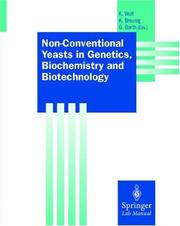| Listing 1 - 5 of 5 |
Sort by
|
Book
ISBN: 364244122X 364238319X 3642383203 Year: 2013 Publisher: New York : Springer,
Abstract | Keywords | Export | Availability | Bookmark
 Loading...
Loading...Choose an application
- Reference Manager
- EndNote
- RefWorks (Direct export to RefWorks)
Due to various special physiological features and a genome that greatly differs in structure, gene content and organization from other yeasts, Y. lipolytica is widely used as a model organism. With its characteristics, such as the ability to accumulate oil and the high capacity for secretion of proteases and lipases, the yeast is also of great interest for biotechnological applications. The main topics covered in this Microbiology Monograph are: comparative genomics; mitochondrial genomics and proteomics, including the analysis of the respiratory chain; transposable elements and their activities; non-coding RNA genes, which display a number of unusual and remarkable features compared to other hemiascomycetes; utilization of hydrophobic substrates, of n-alkane and its oxidized derivatives as sources of carbon and energy; ambient pH signalling; comparison of protein families in non-conventional yeasts and S. cerevisiae; and the sulphur metabolism of cheese-ripening yeast.
Biology --- Health & Biological Sciences --- Microbiology & Immunology --- Genetics. --- Genomes. --- Life sciences. --- Biotechnology. --- Microbiology. --- Biochemistry. --- Life Sciences. --- Eukaryotic Microbiology. --- Biochemistry, general. --- Applied Microbiology. --- Genetics --- Genomics --- Haploidy --- Embryology --- Mendel's law --- Adaptation (Biology) --- Breeding --- Chromosomes --- Heredity --- Mutation (Biology) --- Variation (Biology) --- Chemical engineering --- Genetic engineering --- Microbial biology --- Microorganisms --- Biological chemistry --- Chemical composition of organisms --- Organisms --- Physiological chemistry --- Chemistry --- Medical sciences --- Composition
Book
ISBN: 3642385826 3642435556 3642385834 Year: 2013 Publisher: Berlin ; New York : Springer,
Abstract | Keywords | Export | Availability | Bookmark
 Loading...
Loading...Choose an application
- Reference Manager
- EndNote
- RefWorks (Direct export to RefWorks)
Due to various special physiological features and a genome that greatly differs in structure, gene content and organization from other yeasts, Y. lipolytica is widely used as a host system. With its characteristics, such as the ability to grow on lipids or grease, to accumulate oil and the high capacity for secretion of proteases and lipases, the yeast is of great interest for biotechnological applications. The main topics covered in this Microbiology Monograph are: expression and secretion of heterologous proteins; acid and alkaline extracellular proteases; genetics, production, biochemical characterization and biotechnological application of lipases; production and secretion of several organic acids and flagrances; as well as the functional expression of P450 systems and its use in steroid biotransformation.
Biology. --- Mycology. --- Yeast fungi. --- Biology --- Health & Biological Sciences --- Microbiology & Immunology --- Yeast fungi --- Fungi --- Biotechnology. --- Industrial applications. --- Industrial mycology --- Yeast --- Yeast biotechnology --- Biotechnology --- Life sciences. --- Microbiology. --- Biochemistry. --- Life Sciences. --- Eukaryotic Microbiology. --- Applied Microbiology. --- Biochemistry, general. --- Microbial biotechnology --- Yeast industry --- Biological chemistry --- Chemical composition of organisms --- Organisms --- Physiological chemistry --- Chemistry --- Medical sciences --- Chemical engineering --- Genetic engineering --- Microbial biology --- Microorganisms --- Composition
Digital
ISBN: 9783642383205 Year: 2013 Publisher: Berlin, Heidelberg Springer
Abstract | Keywords | Export | Availability | Bookmark
 Loading...
Loading...Choose an application
- Reference Manager
- EndNote
- RefWorks (Direct export to RefWorks)
Due to various special physiological features and a genome that greatly differs in structure, gene content and organization from other yeasts, Y. lipolytica is widely used as a model organism. With its characteristics, such as the ability to accumulate oil and the high capacity for secretion of proteases and lipases, the yeast is also of great interest for biotechnological applications. The main topics covered in this Microbiology Monograph are: comparative genomics; mitochondrial genomics and proteomics, including the analysis of the respiratory chain; transposable elements and their activities; non-coding RNA genes, which display a number of unusual and remarkable features compared to other hemiascomycetes; utilization of hydrophobic substrates, of n-alkane and its oxidized derivatives as sources of carbon and energy; ambient pH signalling; comparison of protein families in non-conventional yeasts and S. cerevisiae; and the sulphur metabolism of cheese-ripening yeast.
General microbiology --- General biochemistry --- Biology --- Medical microbiology, virology, parasitology --- Biotechnology --- gisten --- toegepaste microbiologie --- proteomics --- genomics --- biochemie --- biologie --- microbiologie --- biotechnologie --- kaas
Digital
ISBN: 9783642385834 Year: 2013 Publisher: Berlin, Heidelberg Springer
Abstract | Keywords | Export | Availability | Bookmark
 Loading...
Loading...Choose an application
- Reference Manager
- EndNote
- RefWorks (Direct export to RefWorks)
Due to various special physiological features and a genome that greatly differs in structure, gene content and organization from other yeasts, Y. lipolytica is widely used as a host system. With its characteristics, such as the ability to grow on lipids or grease, to accumulate oil and the high capacity for secretion of proteases and lipases, the yeast is of great interest for biotechnological applications. The main topics covered in this Microbiology Monograph are: expression and secretion of heterologous proteins; acid and alkaline extracellular proteases; genetics, production, biochemical characterization and biotechnological application of lipases; production and secretion of several organic acids and flagrances; as well as the functional expression of P450 systems and its use in steroid biotransformation.
General microbiology --- General biochemistry --- Biology --- Medical microbiology, virology, parasitology --- Biotechnology --- gisten --- toegepaste microbiologie --- biochemie --- biologie --- microbiologie --- biotechnologie

ISBN: 3540442154 Year: 2003 Publisher: Berlin Springer.
Abstract | Keywords | Export | Availability | Bookmark
 Loading...
Loading...Choose an application
- Reference Manager
- EndNote
- RefWorks (Direct export to RefWorks)
| Listing 1 - 5 of 5 |
Sort by
|

 Search
Search Feedback
Feedback About UniCat
About UniCat  Help
Help News
News